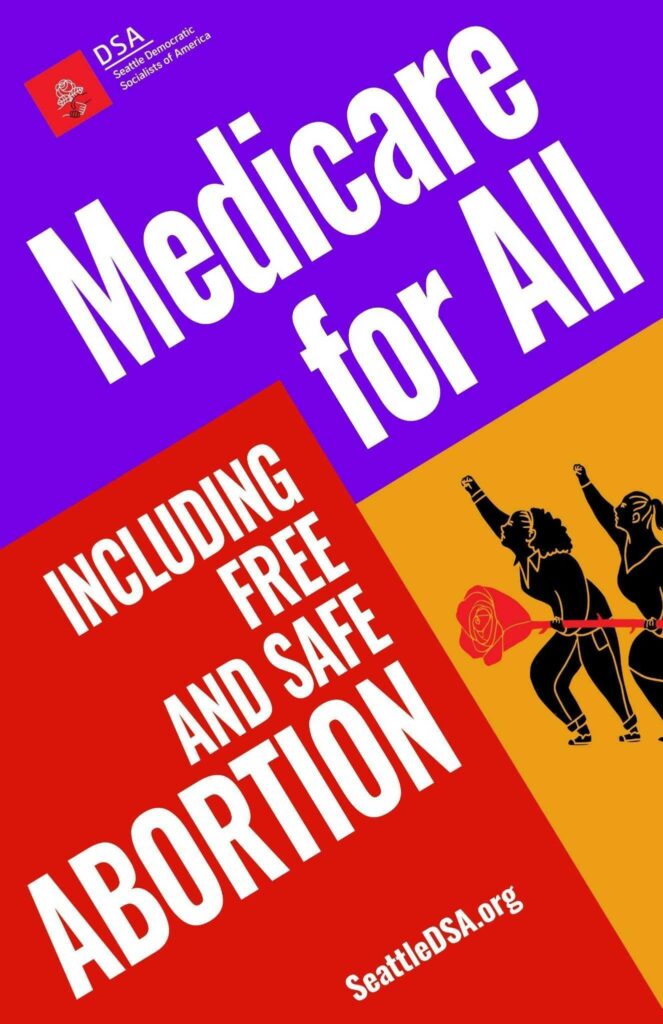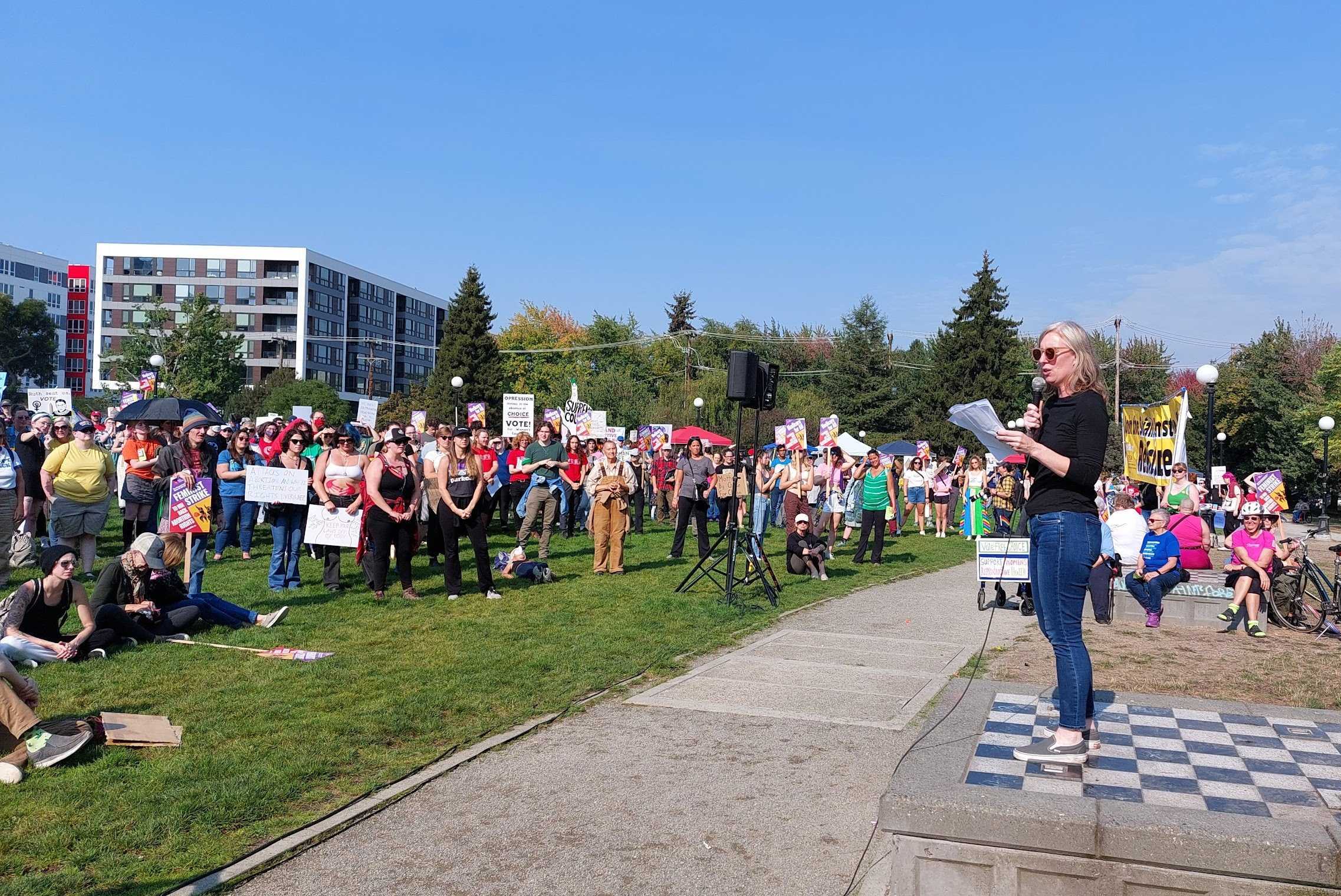Seattle DSA engages in a united front with left and liberal forces to lead a rally to win back reproductive rights.
By Sean C and Kate C

In August, the Women’s March called for a national Weekend of Action to be held October 7–9, including a march on Washington, DC on October 8. On that weekend, over 400 rallies, marches, and protests were held in all 50 states in opposition to the Supreme Court’s overturning of Roe v. Wade in June. The Women’s March set the theme of the actions as a “Women’s Wave,” the implication being that the purpose of the marches was to stoke excitement about and support for pro-choice (read: Democratic) candidates a month ahead of the midterm elections.
In Seattle, the call to action was taken up by the Seattle Democratic Socialists of America and Seattle Green Wave, a student organization at the University of Washington that works to destigmatize abortion and provide education on reproductive justice. The rally and march, held Saturday, October 8 at Cal Anderson Park, drew a crowd of 500 people and was endorsed by over 20 organizations. Endorsing unions included the MLK County Labor Council, UNITE HERE local 8, the Seattle Education Association, and the United Food and Commercial Workers local 3000, the largest private-sector union in Washington State. The rally was the largest event Seattle DSA organized this year.
A United Front Strategy
In preparing for our rally to defend reproductive rights, Seattle DSA’s Reproductive Justice Working Group outlined—and the chapter approved—a “united front” resolution stating our intention to organize around the Women’s March’s call to action and to assemble a broad coalition, including Democrats.
Many on the US left might question—for good reason—why socialists would organize under the banner of the Women’s March, and why we would want to work alongside Democratic Party politicians. It is not because we have illusions in the liberal, pro-capitalist politics of these entities. Rather, organizing alongside such forces—while, crucially, maintaining political independence from them—allows us to bring a bold, socialist message to wider layers of people. The fact that the rally was associated with and promoted by the Women’s March undoubtedly drew out hundreds of people who, while angry about the overturning of Roe, had not yet been exposed to a clear explanation of socialist politics. Inviting Democrats to speak at our rally also allowed us to clearly contrast our messaging and strategies to theirs.
The predominant form of feminism in the US is liberal feminism, an ideology that advocates enhanced rights for women without challenging the framework capitalist society. Liberal feminism speaks out against the oppression of women, but engages in ineffective strategies. It propagates illusions in the Democratic Party, saying that if we simply elect more Democrats, our rights will be restored. It lionizes figures like Ruth Bader Ginsberg while ignoring the undemocratic nature and ruling-class character of the Supreme Court. It fails to understand the history of abortion rights in the US (and around the globe), which were not granted to us by the Supreme Court from on high, but won in the streets by organized, radical movements in the 1960s and 1970s. Liberal feminism—like many of the Democratic politicians who embody it—does not demand Medicare for All, and like most liberal ideologies, liberal feminism traffics in condescending moralizing rather than working-class solidarity.
In contrast, socialist-feminism is clear about the class dynamics at play in the overturning of Roe, and in society in general. As socialist-feminists, we know that even before Roe was overturned, many people already faced barriers to accessing reproductive healthcare, particularly poor and working-class women, women of color, and trans people. We know that in order to achieve reproductive justice, we need Medicare for All to guarantee free reproductive healthcare, including abortion, contraception, and gender-affirming healthcare. And we know that reproductive freedom cannot be meaningfully exercised without full funding and access to other basic economic rights—the right to housing, to food, to education, to employment.
Socialist-feminists understand that the Republican Party is the most belligerent aggressor against our right to bodily autonomy. But we also understand that the billionaire-controlled Democratic Party has played a key role in hampering the expansion of abortion rights, and has failed to protect the inadequate rights we did have—while cynically fundraising off threats to those rights even to this day.
Democratic politicians pay lip service to the rights of oppressed groups, and pass reforms in our favor when they are under pressure from public opinion or grassroots social movements. But the Democratic Party’s primary allegiance is to the corporate billionaire class that funds their election campaigns. When Democratic politicians have to choose between fighting unapologetically for free healthcare for all (including reproductive healthcare) and caving to the donor class, their allegiance to health insurance companies and their fear of the corporate media wins out almost every time.
Nonetheless, we live in a time when the majority of women and working-class people still have some degree of hope in the Democratic Party. Socialists must therefore fight alongside liberals for abortion rights, but we must not get behind them. We must engage them in friendly conversations and joint struggles while boldly making the case for independent, class politics. While Democrats make vague promises that are appealing to the oppressed (but not too offensive to the corporate elite), socialists should raise concrete demands. We fight for Medicare for All, for expanding the Supreme Court, for abolishing the filibuster, and passing the Women’s Health Protection Act (which would codify Roe v. Wade into federal law, overriding any state bans).
Engaging in this united front strategy can move more ordinary people into struggle and grassroots movements, where oppressed people often feel more empowered by our collective strength, and thereby become much more open to a socialist perspective.
Seattle DSA had 3 excellent speakers at the rally—Sarah WK, Kelsey B, and Sunny R—who presented a strong message of working-class solidarity and the need to build an organized movement to win back and expand reproductive rights. They also pointed to the need to overthrow capitalism and establish a democratic socialist society in order to truly liberate ourselves. Our speakers (and the speakers from our coalition partners) stood in stark contrast to a speaker from Senator Patty Murray’s office, who, while correctly pointing out the real danger of the Republican Party, simply urged the crowd to vote for Patty Murray and other Democrats in the upcoming midterm elections. Later in the program, Seattle DSA member and Data Director for the Whole Washington campaign Kelsey B started off her speech by calling out Senator Murray for not supporting Medicare for All.
Building the Confidence and Profile of DSA
Seattle DSA can be very proud of its work in organizing the October 8 rally. Many members gained critical experience in planning and running a rally and march. We had a strong tabling presence, handed out hundreds of socialist-feminist fliers with an invitation to join the next meeting of our Reproductive Justice Working Group, and politicized the rally by assembling and handing out dozens of picket signs calling for Medicare for All and raising the idea of a feminist strike. We also raised nearly $4000 to help cover the costs of the rally (around $4400 total), including $3100 from our endorsers (special thanks to UFCW 3000, SEIU 1199W’s staff union, City Councilmember Kshama Sawant, and the Seattle Education Association).
We also built important relationships with local unions and community organizations, relationships we should foster through continued coalition work in the future. In particular, we’re proud to have worked with Seattle Green Wave on this rally, and loved having their banner and our banner leading the march together. We intend to support their organizing going forward and hope to collaborate with them again soon, and we thank them for helping to make this a truly multi-generational event.
Two truly inspirational moments in the march stand out. First was a serendipitous intersection with a rally at Westlake Center protesting the persecution of the Hazara peoples (an ethnic minority in Afghanistan) by the Taliban. What could have been a tense moment instead became one of solidarity as our chant leaders began chanting “stop Hazara genocide” alongside the Afghan community members. We then invited one of their organizers to speak on our sound system and tell us about their cause, and our MC shared with them about the need to fight for abortion rights.
Another highlight was marching through Pike Place Market, teeming with confused and excited tourists. Marching through the market while chanting “voting blue is not enough, Democrats we call your bluff” felt damn good.
What Next for Reproductive Justice in Seattle?
We have a lot to be proud of and to build off of coming out of this event. Given the unwillingness of the Democratic Party and liberal NGOs like Planned Parenthood to mobilize for this event and others like it across the country, the turnout of around 500 people was impressive. But it’s clear there’s a lot more anger and energy around abortion rights to be tapped into. Upwards of 60 percent of Americans disagree with the overturning of Roe. Fifty-nine percent of voters in Kansas—no left-wing stronghold—recently voted down a measure to remove abortion rights from the state constitution.
Across the board, turnout for the Women’s March’s Weekend of Action should have been much higher. The original Women’s Marches in 2017 drew nearly 5 million people into the streets across the country. Half a million marched in DC; nearly 200,000 marched in Seattle. This past weekend, the count in DC was in the mere thousands. Most cities were in the hundreds. In 2017, Planned Parenthood and the Democratic Party were heavily involved in supporting the marches. This time, not so much.
In planning our rally, we reached out to Planned Parenthood many times seeking an endorsement and a speaker. We finally got through to an organizer a week before the event and were told Planned Parenthood didn’t have the “capacity” to send a speaker for a 5-minute speech because they were dedicated to doing voter outreach for Democrats every Saturday. Apparently, speaking to hundreds of voters at a rally doesn’t count as voter outreach.
It would have been in the interest of Planned Parenthood and Democratic politicians to mobilize people to this national weekend of action called by the Women’s March. However, they are so entrenched in establishment electoral politics that building a mass movement does not strike them as worth their time, even though mass movements like the suffragette movement, the civil rights movement, and the labor movement have historically been the driving force for progressive change.
We invited 4 Democratic politicians to speak at, endorse, and promote our rally. Staffers for Pramila Jayapal, Maria Cantwell, and Patty Murray all told us the Congresswomen were too busy to attend. City Councilmember Teresa Mosqueda’s office never got back to us. However, Patty Murray—who is facing a challenger in this year’s election—sent a representative to read a statement.
We’re thrilled to have had the amount of union support that we did for this event. In particular, the support of UFCW 3000 was critical. But in reaching out to unions for endorsement, the conservatism of the leadership in some unions was on full display. An example is the Seattle Education Association (SEA) whose Representative Assembly had adopted a clear position of supporting rallies for reproductive rights such as ours. DSA members in SEA moved a resolution asking the union to donate $1000 to help cover expenses for the rally. The proposal launched a heated debate within the Representative Assembly where red-baiting fears were raised about the potential dangers of donating to a socialist “political party.” SEA activists responded by defending DSA and the struggle for reproductive justice, and two-thirds of Assembly Representatives ultimately voted in favor of donating the money, whereas the union leadership voted against it.
To build a movement to win back and expand abortion rights, we cannot rely on the Democratic Party, nor the NGOs and labor bureaucracy that follow the lead of the Democratic Party. At the same time, socialists must not alienate ordinary working-class people who genuinely want to fight for these rights but have illusions in the Democratic Party and liberal ideas.
Let’s stand together in the fight and wear our politics on our sleeves. And as we help build the movement to win back reproductive rights, let’s build the socialist-feminist wing of the movement.
Join us and help us decide where we go from here. Here are some steps you can take right now:
- Join the next meeting of Seattle DSA’s Reproductive Justice Working Group. Join our reading groups and help us build coalitions and protests to win back reproductive rights
- Sign the Whole Washington petition and volunteer to get universal healthcare on the ballot
- Check out Seattle Green Wave, and organize with them if you’re a UW student
- If you haven’t already, join DSA and help us build toward a socialist future!

